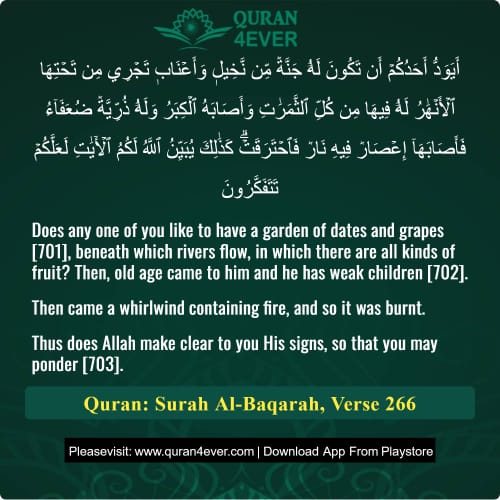
Transliteration:( Ayawaddu ahadukum an takoona lahoo jannatum min nakheelinw wa a'naabin tajree min tahtihal anhaaru lahoo feehaa min kullis samaraati wa asaabahul kibaru wa lahoo zurriyyatun du'afaaa'u fa asaabahaaa i'saarun feehi naarun fahtaraqat; kazaalika yubaiyinul laahu lakumul aayaati la'allakum tatafakkaroon )
"Does any one of you like to have a garden of dates and grapes [701], beneath which rivers flow, in which there are all kinds of fruit? Then, old age came to him and he has weak children [702]. Then came a whirlwind containing fire, and so it was burnt. Thus does Allah make clear to you His signs, so that you may ponder [703]."
This parable is a vivid example of insincere or spurious charity.
Just as a man in old age would be devastated to see his lush garden destroyed, so too will the hypocrite or show-off feel on the Day of Judgement—when their charity brings no benefit, at the exact moment they are in most need of reward.
The phrase "old age came to him and he has weak children" symbolizes:
A state where a person needs wealth the most,
But has no strength left to earn it—just as on the Day of Judgement, one cannot earn rewards anymore.
On that Day, although the believer recited Qur'an and prayed, these acts will not bring new reward.
Reward is only granted for deeds done in one’s lifetime.
This is why rewards are conveyed to the deceased, as they can no longer earn them on their own.
The parable teaches two main lessons:
Do not perform good deeds to show off.
Do not follow good deeds with sin, which can erase or ruin the reward.
If someone does so, he will feel deep regret on the Day of Judgement, just like the man who loses his garden in a fiery whirlwind.
Just as good deeds can wipe out sins, some sins can wipe out good deeds.
As Allah warns:
“Lest your deeds are wasted…” (Surah Al-Hujurat, 49:2)
265. And the parable of those who spend their wealth seeking Allah’s pleasure while they in their own selves are sure and certain that Allah will reward them (for their spending in His cause), is that of a garden on a height; heavy rain falls on it and it doubles its yield of harvest. And if it does not receive heavy rain, light rain suffices it. And Allah is All-Seer (knows well) of what you do.) This is the example of the believers who give away charity seeking only Allah’s pleasure,
(while they in their own selves are sure and certain) meaning, they are certain that Allah shall reward them for these righteous acts with the best rewards. Similarly, in a Hadith collected by Al-Bukhari and Muslim, the Messenger of Allah said,
(Whoever fasts Ramadan with faith and expectation…) meaning, believing that Allah commanded the fast, all the while awaiting His reward for fasting it.
Allah’s statement,
(is that of a garden on a Rabwah) means, the example of a garden on `a height above the ground’, as the majority of scholars have stated. Ibn `Abbas and Ad-Dahhak added that it also has flowing rivers.
Allah’s statement,
(Wabil falls on it) means, heavy rain as we stated, So it produces its,
(yield of harvest) meaning, fruits or produce,
(doubles), as compared to other gardens.
(And if it does not receive Wabil, a Tall suffices it.)
Ad-Dahhak said that the `Tall’ is light rain. The Ayah indicates that the garden on the Rabwah is always fertile, for if heavy rain does not fall on it, light rain will suffice for it. Such is the case regarding the believer’s good deeds, for they never become barren. Rather, Allah accepts the believer’s righteous deeds and increases them, each according to his deeds. This is why Allah said next,
(And Allah is All-Seer of what you do) meaning, none of His servants’ deeds ever escapes His perfect watch.
(2:266) Would any of you desire that he should have a garden of palms and vines with rivers flowing beneath it – a garden in which he has every manner of fruit – and that it should then be struck by a fiery whirlwind and be utterly burnt down at a time when old age has overtaken him, and his offspring are still too small to look after their affairs?[307] Thus does Allah make His teachings clear to you that you may reflect.
307. It is obvious that a man does not like to see the earnings of his lifetime destroyed in his old age, when he needs them badly and when he can no longer earn. How is it, then, that he can contemplate stepping into the realm of the Hereafter and finding suddenly that he is empty-handed; that he has sown nothing from which he can reap the fruit? In the Next World there will he no opportunity to begin earning anew. Whatever one can do towards ensuring one’s well-being in the Hereafter must he done in this world. If one devotes oneself totally to the pursuit of the riches of this world rather than to the Hereafter, one’s situation will be as pitiable as that of the age-stricken man whose orchard (his source of income in his old age) is reduced to ashes too late for him to produce a new one.

For a faster and smoother experience,
install our mobile app now.
Related Ayat(Verses)/Topics